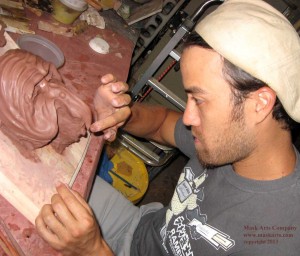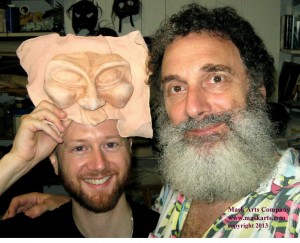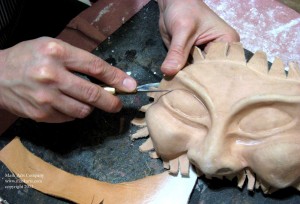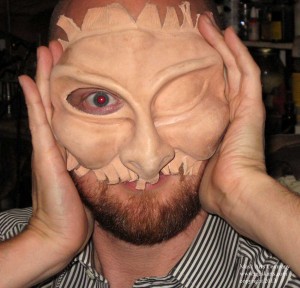By: Stanley Allan Sherman
© Copyright 2013
It all started with an article in the Drama Review in the 1970’s or 80’s about the mask makers of Bali. The writer I met when telling the story of his article to a hand full of people interested in mask making and performance, at a Movement Theater International Festival in Philadelphia, Pennsylvania in the 1980’s. The writer just happened to be one of these people and when I finished he told me he was the writer and how great it is that someone is really using the information he wrote about. “The mask makers of Bali make two kinds of masks, ones for the tourist and ones for their religious rituals. They are the same deigns but are different. The masks they make for their religious rituals they put a soul into, the masks they make for the tourist they do not put a soul into.” Reading this stopped me. How does one put a soul into a mask?

Mask making student, Isaac H. Woofter sculpting his leather Commedia dell’Arte mask in clay.
The article and the mask makers of Bali said nothing about how they go about putting a soul into a mask.

Mask making student, Chris Davies, pulling his first leather mask. You can see the energy in the mask. The guy with the beard is Stanley Allan Sherman.
About this time the great theater artist, producer, actor, writer and director Vasek Simek, one of my mentors when I first came to NYC in 1975, paid me to make him my first leather mask. Having made a few masks, which no one taught me how to make. There was nothing written about mask making at the time. Vasek felt I could succeed and he put his money down. Which meant I had to produce a leather mask. Having made many cloth and paper meche masks, going to leather was another world. Having succeeded, putting a soul into a mask occupied me.

Chris Davies, very carefully cutting the eye out in his mask. When cutting you must be very careful and use a very sharp knife, which you sharpen often.
The real leap was the soul in the mask. There is no physical technique for doing this. It is part of your creative muscle you choose to develop and use. Just like you build a character, you place the soul into the mask that is your characters. Consider this – you are creating/designing a living person. Not a child, who you have no control over, placing a person, persona of age, characteristics, feelings, moods, habits and outlook, which can equals putting a soul into your mask/work. As you’re creating your mask you put all this into your design – which is where it is developed. Then in your sculpture where it is refined and is living. Finally during the creating of the physical mask, you let all the elements flow into your mask. You finish your mask with the same energy.

Chris Davies with one eye cut out. Chris is a wonderful jewelry designer checkout his website.
Of course you are also using techniques and skills you have. It is a combination of the two you need and you can develop. Resulting with a mask coming alive when the player puts your mask on easily becoming one with their mask. Yes, this is transferable to other arts as well.
I now take on private students, teaching paper/cloth meche, neoprene latex and leather mask making. For clowns there is how to make your own custom leather clown nose. Have a question please ask.
Follow me on facebook “like” https://www.facebook.com/maskartsnyc
Classes, workshops, directing & more

I did a Balinese mask workshop with Serge Nicolaï, a very fine performer who works at Theatre du Soleil. I had never been interested in mask work but since this was a special workshop and I love Teatre du Soleil I thought this was a great opportunity to get to know their work. The first time I attempted to put on a Balinese mask it was an old lady’s mask. Sege asked us to first look at the mask in detail. When I put it on my face I started to cry like a baby. I was convinced that this lady was full of suffering and it just made me cry and cry. Serge understood and he told me not to worry about the impro I was about to do. I swear that mask had a soul and a very old and true one.
Serge sounds like a very good teacher. Just holding the mask and looking it, breathing with it will do a great deal in prepping to perform with the mask. The soul of the mask and finding it, letting it live taps into the joy of performing with masks.